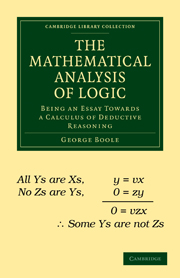
-
Select format
-
- Publisher:
- Cambridge University Press
- Publication date:
- 29 August 2010
- 20 July 2009
- ISBN:
- 9780511701337
- 9781108001014
- Dimensions:
- Weight & Pages:
- Dimensions:
- (216 x 140 mm)
- Weight & Pages:
- 0.13kg, 92 Pages
You may already have access via personal or institutional login
Book description
Self-taught mathematician George Boole (1815–1864) published a pamphlet in 1847 – The Mathematical Analysis of Logic – that launched him into history as one of the nineteenth century's most original thinkers. In the introduction, Boole closely adheres to two themes: the fundamental unity of all science and the close relationship between logic and mathematics. In the first chapter, he examines first principles of formal logic, and then moves on to Aristotelian syllogism, hypotheticals, and the properties of elective functions. Boole uses this pamphlet to answer a well-known logician of the day, Sir William Hamilton, who believed that only philosophers could study 'the science of real existence', while all mathematicians could do was measure things. In essence, The Mathematical Analysis of Logic humbly chides Hamilton and asks him to rethink his bias. Boole is compelling reading for anyone interested in intellectual history and the science of the mind.
Contents
Metrics
Altmetric attention score
Full text views
Full text views help Loading metrics...
Loading metrics...
* Views captured on Cambridge Core between #date#. This data will be updated every 24 hours.
Usage data cannot currently be displayed.
Accessibility standard: Unknown
Why this information is here
This section outlines the accessibility features of this content - including support for screen readers, full keyboard navigation and high-contrast display options. This may not be relevant for you.
Accessibility Information
Accessibility compliance for the PDF of this book is currently unknown and may be updated in the future.


